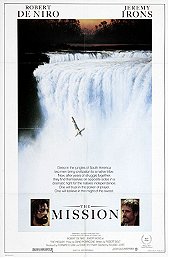Back in 1984, Roland Joffe accomplished the near impossible; his major motion picture debut, The Killing Fields, defied every expectation typically associated with neophyte filmmakers and what Joffe delivered was one of the most powerful and moving films I've ever seen. So it's no surprise I highly anticipated his follow-up film, The Mission, and it's obvious that by bringing back the same team (producer David Puttnam, cinematographer Chris Menges, and editor Jim Clark), they attempted to capture the proverbial "lightning in a bottle" a second time. Unfortunately, the end product isn't quite cinematic magic.
Set in the 18th century, Jeremy Irons stars as Father Gabriel, one of several Spanish Jesuit priests (including Liam Neeson) assigned to convert the Guarini tribe of South America into Christians. His efforts are gradual, but successful. Converging with this story is Rodrigo Mendoza (Robert De Niro), a slave trader who seeks penance after killing his own brother in a fit of rage. For all the Guarini that he has killed or sold off into slavery, they still show compassion and forgiveness towards him, and he is accepted into the mission, even converting into a Jesuit priest under the guidance of Father Gabriel.
The priests and the Guarini natives eventually find themselves in heated discussion with politicians and slave-owners, who are debating over whether the mission should fall under the rule of Portugal, thus endangering all the Guarini with the possibility of being made into slaves. Determined to prevent such an action at any cost, Mendoza takes up his sword once more, coming into conflict with Father Gabriel's peaceful approach.
The Mission was released in 1986 with little success in theaters, despite garnering a respectable 7 Oscar nominations, including Best Picture. Since then, it's developed a devoted fan base who consider it among the most underrated films of the decade. As much as I'd like to, I can't quite agree. Though a respectable and often beautifully crafted effort, the film ultimately comes up short in human interest and emotions, with Joffe often favoring lingering shots of lush jungle scenery and needlessly overlong political machinations involving secondary characters whom we couldn't care less about.
The film is divided into three acts, the first, involving the spiritual transformation of Mendoza, is easily the most compelling. Despite De Niro's occasionally stilted performance (his delivery of some of the dialogue, particularly "Are you laughing at me?" still makes me cringe), his emotional torment is heartfelt and absorbing and his acceptance into the mission is genuinely moving. It's almost all downhill from there.
The build-up in the second act is initially effective, with the heated debate over the Guarini engrossing, but the conflict eventually loses steam when we're subjected to dull, endless dialogue that grows inadvertently confusing even as it intends to clear up the matters at hand. It's also in the middle segment the film loses its human focus and all that's really left is the question of will they or won't they fight.
The third act is the inevitable battle, and while there are a few powerful moments amidst the chaos, the sequence is a badly choreographed mess. The editing also feels a little rough, with quite a few scenes feeling like they clocked in a little too soon (the sudden transition after Irons' "God is love!" line is disjointed, to say the least). The Guarini are never developed beyond the typical "noble savage" portrayal, so it's difficult to feel for their plight beyond the fact that their forced subjugation and mass slaughter is a heinous crime. I wanted to feel more for them, but they're merely a backdrop for the more seasoned cast.
As Father Gabriel, Jeremy Irons is superb, unquestionably one of the film's consistent bright spots. It's unfortunate he's never that well-developed in any of the film's separate acts, but his performance alone is able to draw us in even if the script lets him (and the audience) down. In supporting roles, Ray McAnally and Liam Neeson are excellent, though a bit limited in screen time. For Neeson, this was more of a hint of greater things to come.
Ennio Morricone's score deserves a special mention; whatever emotions Joffe is unable to convey on screen, Morricone's music can conjure in just a few notes. It's one of the most beautiful scores I've had the pleasure to listen to, especially in segments with oboe and flute. The chorus in the background is perhaps a bit much, but an overpowering score can do wonders in a film otherwise unable to muster all the intended emotions.
Joffe's work in the film is still overall quite solid, but he completely lost his footing soon afterward, losing a grip on his career with a long string of critical and financial disasters, including Super Mario Bros., The Scarlet Letter, and Goodbye Lover. I'm convinced The Killing Fields was not a fluke, but the sign of a genuine auteur who showed his prowess thanks to a brilliant script and cast. Blend those two elements with his natural skills and I'm sure we'll get a film worthy of mention alongside his debut. Let's just hope this happens sooner rather than later.
 Login
Login